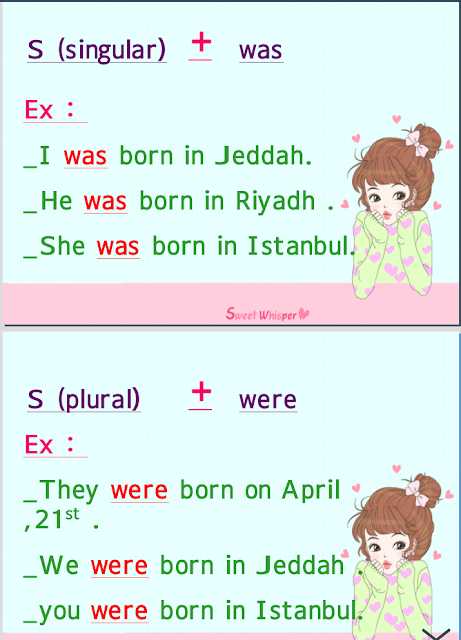Page 19, Ex : A
1. Q: How often do you walk to school?
A: I never walk to school.
2. Q: How often do you watch TV?
A: I never watch TV.
3. Q: How often do you clean your room? A: I sometimes clean my room.
4. Q: How often do you go to the mall?
A: I sometimes go to the mall.
5. Q: How often do you do your homework?
A: I always do my homework.
Ex: B page :19
1. played 4. studied 7. made 10. drove
2. met 5. grew 8. had
3. got 6. went 9. went
Page 20 Ex: C
1. Where did your uncle live?
2. What did Amal do/watch yesterday evening?
3. What did Hussain wear to the job interview?
4. What did they do on the airplane?
5. Where did your brother go to college?
6. Where did Ali and his family stay last year when they went to the beach?
Ex: D
1. My parents were married in Jeddah.
2. I was raised in Jeddah.
3. I was called LoLo when I was young.
4. My father was educated in Riyadh.
Ex: E
1. Q: What did Ibrahim use to eat?
A: He used to eat a lot of fast food.
2. Q: What did they use to study?
A: They used to study English.
3. Q: What did Saeed use to drive?
A: Saeed used to drive his father’s car.
4. Q: What did your brother and you use to drink every
morning before school?
A: My brother and I used to drink milk every morning before school.
Page 21
Ex: F
1. The bus is arriving at 10 A.M.
2. Robert is meeting his friend at the bus station today.
3. Robert and his friend are going to the museum later.
4. Robert and his friend are eating at a fast food
restaurant after the museum.
5. Robert is going to the bus station at 4 P.M.
Ex: G
1. will fy 3. will leave 5. will arrive
2. am going to go 4. will see
6. is going to leave
Page 22;
Ex: H
1. He is going to take a trip.
He is going to talk on his cell phone.
2. He will probably fly on a plane.
He will probably visit his friends.
Ex:L
Write your own answers
Ex:J
Write a paragraph.
This is an example.
Conservation at Home
My family and I conserve water and electricity at home, and we will probably do other things to conserve more. Right now, every time I leave a room, I turn of the lights. This is simple to do, but it helps a lot. We will probably watch less TV, too. I don’t like this idea, but my parents think it is a very good idea. We don’t do a lot to conserve water at home. I have a good idea for this. I probably won’t wash the family car. It’s hard work and it uses a lot of water. My father probably won’t like this idea!



















































